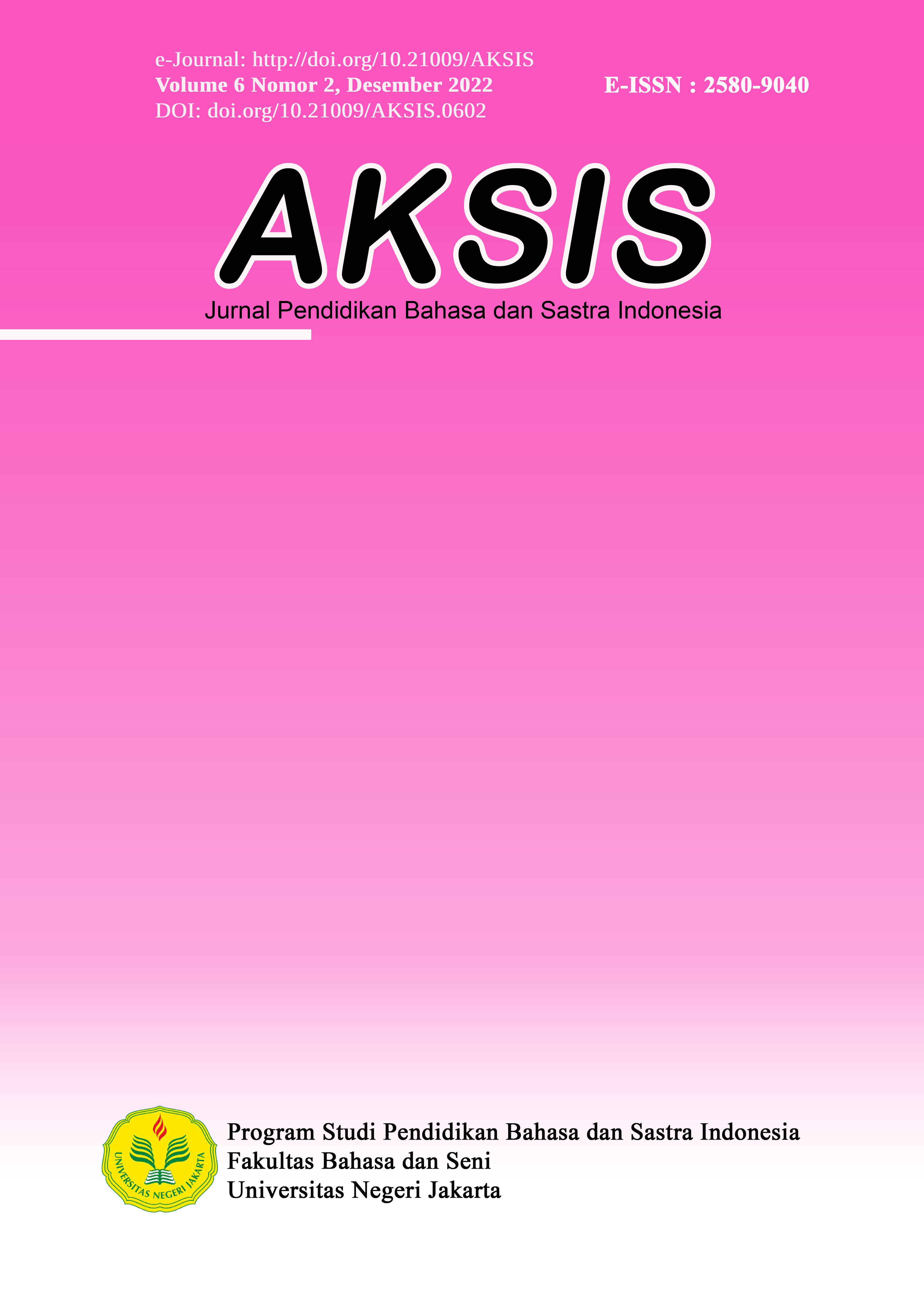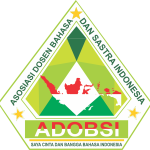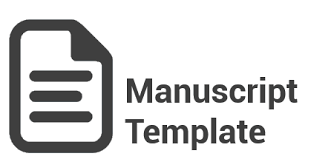Analysis of Expressive Speech Acts on the 2017 IPSE YouTube Channel about Panel Discussion of Language Education Course Papers Indonesia IPSE students 2017
DOI:
https://doi.org/10.21009/AKSIS.060203Kata Kunci:
analysis, pragmatics, speech acts, expressive, discussionAbstrak
Speech acts are illocutionary acts that function to express an assessment of the circumstances specified in the illocutionary, for example saying thank you, expressing condolences, and so on. The research objectives to be achieved in this study are: (1) to reveal the types of expressive speech acts contained in the YouTube channel IPSE (International Program on Science Education) 2017 regarding Panel Discussion of Language Education Course Papers, (2) to Identify forms of speech acts in learn Language Education Course Paper Panel. This research is a descriptive study that in the end tries to describe the speech spoken by the object, which is in accordance with the actual picture. In this study, the method used is the referential method. The listening method was used in this study because the data or object used is in the form of spoken language. there are 59 expressive speeches in 7 videos on the YouTube channel IPSE (International Program on Science Education) 2017 regarding the Panel Discussion of Language Education Course Papers. Among them are asking for 7 as many utterances, apologizing as much as 38 38, and criticizing as many as 14 utterances. This research is expected to provide benefits to readers or the public in the form of increasing understanding of expressive speech acts.
Referensi
Astuti, S. B., & Retnosari, I. E. (2016). Tindak Tutur Dalamtalkshow Hitam Putih Di Trans 7. Edu-Kata, 3(2), 101–110.
Austin, J. L. (1962). How to do things with words Oxford University Press. London.
Chaer, A. (2010). Pengantar Sosiolinguistik: Perkenalan Awal. Jakarta, Indonesia: PT. Rineka cipta.
Chaer, A., & Agustina, L. (1995). Sosiolinguistik: suatu pengantar. Rineka Cipta.
Fahrizal, L. M. R., & Safitri, E. (2022). Tindak Tutur Ekspresif pada Youtube (Madrasa اسمي المفقود للبنات) Kajian Pragmatik. ‘ A Jami Jurnal Bahasa Dan Sastra Arab, 11(1), 104–117.
Fitriah, F., & Fitriani, S. S. (2017). Analisis Tindak Tutur dalam Novel Marwah di Ujung Bara Karya RH Fitriadi. Master Bahasa.
Fraser, B. (1978). Acquiring social competence in a second language. RELC Journal. https://doi.org/10.1177/003368827800900201
Leech, G. (1983). Prinsip-Prinsip Pragmatik.(diterjemahkan oleh MDD Oka). 1993. Jakarta: Universitas Indonesia.
Mujianto, H. (2019). Pemanfaatan Youtube Sebagai Media Ajar Dalam Meningkatkan Minat Dan Motivasi Belajar. Jurnal Komunikasi Hasil Pemikiran Dan Penelitian, 5(1), 135–159.
Murti, S., Muslihah, N. N., & Sari, I. P. (2018). Tindak Tutur Ekspresif dalam Film Kehormatan di Balik Kerudung Sutradara Tya Subiakto Satrio. Silampari Bisa ….
Nofrita, M. (2016). Tindak Tutur Ekspresif Mengkritik dan Memuji Dalam Novel Padang Bulan dan Cinta di dalam Gelas Karya Andrea Hirata. Jurnal Pendidikan Rokania, 1(1), 51–60.
Nugrahini, W., Sugiarti, D. H., & Maspuroh, U. (2021). Analisis Tindak Tutur Ekspresif pada Youtube Laptop Si Unyil dan Pemanfatanya sebagai Bahan Ajar Teks Laporan Hasil Observasi Di SMP. Edukatif : Jurnal Ilmu Pendidikan, 3(6), 3928–3934. https://doi.org/10.31004/edukatif.v3i6.1309
Oktaviani, R., & Marliana, N. L. (2021). Pengembangan Model Pembelajaran Project Based Learning pada Mata Kuliah Penyuntingan Bahasa Indonesia Berbasis Teknologi Informasi dan Komunikasi.
Pratama, R. K., & Utomo, A. P. Y. (2020). Analisis Tindak Tutur Ekspresif Dalam Wacana Stand Up Comedy Indonesia Sesi 3 Babe Cabita Di Kompas Tv. Caraka, 6(2), 90. https://doi.org/10.30738/.v6i2.7841
Rohmadi, M. (2017). Teori dan Analisis Pragmatik. Surakarta: Yuma Pustaka.
Rustono, H. (1999). Pokok-Pokok Pragmatik. Semarang: CV IKIP Semarang Press.
Saifudin, A. (2019). Teori tindak tutur dalam studi linguistik pragmatik. Lite: Jurnal Bahasa, Sastra, Dan Budaya.
Sari, I. (2020). Analisis dampak pandemi COVID-19 terhadap kecemasan masyarakat: Literature review. Bina Generasi: Jurnal Kesehatan.
Searle, J. R. (1969). Speech acts: An essay in the philosophy of language. books.google.com.
Tantra, F. S., Suntoko, S., & Pratiwi, W. D. (2021). Analisis Tindak Tutur dalam Novel Natisha Karya Khrisna Pabichara (Kajian Pragmatik). Edukatif : Jurnal Ilmu Pendidikan, 4(1), 617–626. https://doi.org/10.31004/edukatif.v4i1.1887
Tarigan, H. G. (2016). Pengajaran semantik. Penerbit Angkasa Bandung.
Wibowo, S. E. (2016). Pragmatik. CV. Sarnu Untung.
Wirga, E. W. (2016). Content Analysis on Youtube Social Media to Support Political Campaign Strategies. Jurnal Ilmiah Informatika Dan Komputer, 21(100), 14–26.
Yule, G. (2006). Pragmatik (Terjemahan Indah Fajar Wahyuni). Yogyakarta: Pustaka Pelajar.
Zamzani, Musfiroh, T., Maslakhah, S., Listyorini, A., & R, Y. E. (2011). Pengembangan Alat Ukur Kesantunan Bahasa Indonesia dalam Interaksi Sosial Bersemuka. Litera, 10(1).






